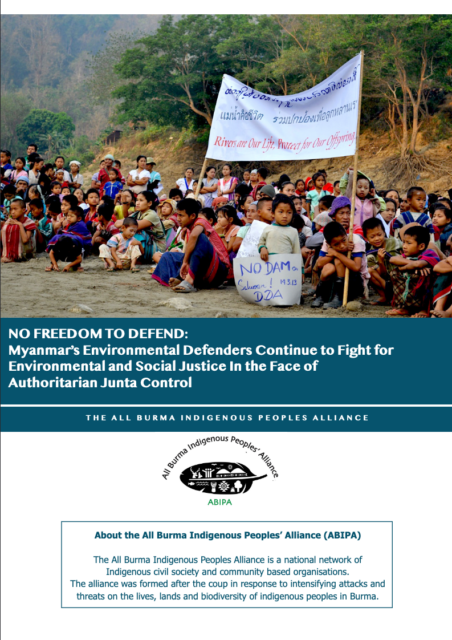No Freedom to Defend: Myanmar’s Environmental Defenders Continue to Fight for Environmental and Social Justice in the Face of Authoritarian Junta Control
15 July 2023


In the wake of the 2021 military coup, the futures of Myanmar’s lands, forests and biodiversity, hang in the balance. In addition to the reignition of armed conflict that has seen over 1.7 million people displaced1, 20,000 arrested, and 3,000 killed2, across the country, illicit mining operations have proliferated, destroying forests, unearthing mountains and polluting surrounding rivers and streams. The Myanmar junta and their allied militias, BGFs, and companies, as well as EAOs have taken advantage of the instability created by the coup utilising this window to make fast profits at the expense of Myanmar’s people, land and forests.
In the face of growing authoritarianism and rapid destruction of Myanmar’s environment and natural resources, indigenous and local environmental human rights defenders (EHRDs) continue to fight for the protection of their lands, forests, rivers and biodiversity. This task, however, has become extremely high risk, due to growing militarization, surveillance, conflict and political instability. A growing number of environmental defenders now either languish in prison, facing extensive jail sentences under false charges, or have had to go into hiding, taking refuge in the forests, borderlands, or neighbouring countries for safety. The introduction of a new set of repressive laws mean that personal freedom and privacy of citizens have been curtailed, and those suspected of engaging in environmental and human rights protection activities can be easily detained.
Environmental defenders also report that a growing network of checkpoints manned by the SAC or other armed actors, particularly around areas where high-value resources are being extracted, has made it increasingly difficult to carry out their work. Defenders and community members are regularly interrogated and searched at checkpoints, making travelling between communities extremely difficult. These enormous pressures have made the work of environmental and human rights defenders increasingly challenging. While civil society groups and networks have had to either disband, go underground or scale-back their operations, community-based organisations and activists report that it is difficult to organize and that many are fearful of conducting conservation activities in the forest as they had done in the past.
Faced with such enormous challenges, environmental defenders are making huge sacrifices in order to continue to protect their lands and forests. Some have had to separate from their families to protect them, and others facing extreme levels of depression due to gravity of the situation. Further, environmental defenders that continue to fight for their lands do so in the knowledge that they or their family’s personal safety could be jeopardised at any time.
Despite the most challenging of circumstances, environmental defenders continue to protect their lands, forests and rivers by organizing their communities, demonstrating and advocating against rapidly expanding natural resource extraction projects, and strengthen local resource management systems. Working in defiance of growing authoritarianism, environmental defenders continue their efforts and sacrifices to protect their communities and biodiversity from destruction and exploitation at the hands of the junta.
Myanmar’s EHRDs stand on the forefront of global struggles against the onset of climate change and biodiversity extinction. As the coup has created a situation in which resources are being rapidly unearthed and the environment degraded, the work of environmental defenders has never been so critical. Despite the critical importance of environmental defenders and the unprecedented challenges they face, many continue under resourced and under supported. This briefing report details the challenges that environmental defenders are facing and calls on local, national and global actors to provide greater support and protection for environmental defenders.
Announcements
21 May 2025
Open letter: Malaysia must lead ASEAN with principle, not hypocrisy, to address the Myanmar crisis

Progressive Voice is a participatory rights-based policy research and advocacy organization rooted in civil society, that maintains strong networks and relationships with grassroots organizations and community-based organizations throughout Myanmar. It acts as a bridge to the international community and international policymakers by amplifying voices from the ground, and advocating for a rights-based policy narrative.